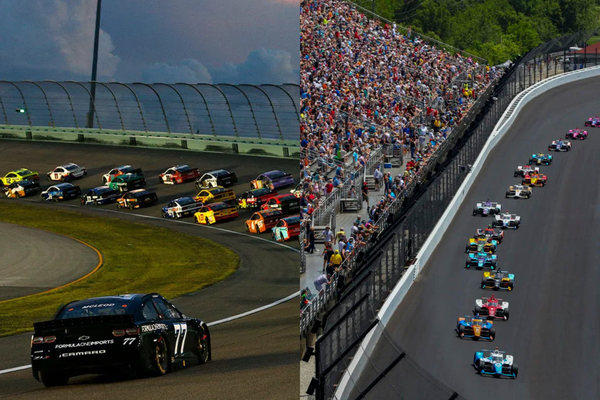

What happens when the man steering stock car racing’s future steps out of its shadow entirely? Bill France Jr. stood at the pinnacle of NASCAR’s heyday in 1998. A new generation of fans crowded grandstands across America, Dale Earnhardt was still chasing checkered flags, and TV numbers were skyrocketing. Yet when asked in a Sports Illustrated interview about expanding into mainstream markets, France’s reply was blunt, “We’ll grow, but not by losing what we are. NASCAR doesn’t need to be everything to everyone.”
That statement evolved into a concept that served as a kind of compass, guiding the sport through transitions without sacrificing its Southern roots. However, that compass appears to be more elusive now, some thirty years later. Particularly now that Ben Kennedy, the great-grandson of Bill France Sr. and the family’s contemporary visionary, is spotted walking through the Long Beach Grand Prix amidst the roar of IndyCars rather than via Martinsville or Darlington. Fans did not miss the moment. Deep within NASCAR’s identity crisis, it touched a nerve. While Kennedy’s presence suggested creativity and even cooperation to some, it shouted disloyalty to others.
The racing world was rocked by rumors when Kennedy, the Senior VP of Racing Development for NASCAR and the great-grandson of the organization’s founder, was spotted strolling down the pits during the 2025 Acura Grand Prix of Long Beach. The scheduling of Kennedy’s appearance at an IndyCar event sparked controversy because NASCAR was hosting a Cup Series race at Texas Motor Speedway that same weekend. But fans are divided in their reactions.
ADVERTISEMENT
Article continues below this ad
Fan reaction: The clash of tradition and innovation as NASCAR faces its future
Backroom talks about a Long Beach-NASCAR crossover have been going on for years. Those hopes were rekindled by Kennedy’s appearance, and with good reason. NASCAR insider Jeff Gluck was quick to contextualize it, reminding fans that “NASCAR already tried to buy [the Long Beach GP] last year. Definitely would have checked a great box.”
The timing is crucial. Kennedy has vigorously pushed NASCAR into urban markets with the triumph of the Chicago Street Race and the Busch Light Clash at the Coliseum. Glitzy, street-based, and close to Los Angeles—a crucial but traditionally elusive market for NASCAR, Long Beach fits the bill.
I know some people will get mad, but there’s nothing wrong with this IMO. Long Beach is an awesome event and they do a ton right in terms of entertaiment; perfectly fine for NASCAR to go to other events and look at how other series do things. https://t.co/J2kSGLUn7j
— Jeff Gluck (@jeff_gluck) April 13, 2025
Todd Fuhrman, a respected motorsports analyst, took it a step further, floating the idea of a NASCAR-IndyCar weekend doubleheader. He wrote in response to Jeff Gluck’s post, “Might not be a bad way to bring a Cup race to the LA area and double dip with an Indy/NASCAR twin bill if logistics worked.”
What’s your perspective on:
Is Ben Kennedy a visionary leader or a traitor to NASCAR's Southern roots?
Have an interesting take?
It wouldn’t be the first time. In 2021 and 2022, but on different days, NASCAR and IndyCar shared a weekend at Indianapolis Motor Speedway. A combined event at Long Beach, which is undoubtedly IndyCar’s largest street race, may increase both series’ visibility.
Another fan captured the long-standing desire with a simple declaration, saying, “Yes! I have been wanting NASCAR at Long Beach for years.” But for every fan dreaming of innovation, there was one fuming over what they saw as neglect of NASCAR’s core. The most viral reaction didn’t hesitate: “He can stay out there. That dude and his family are what’s wrong with NASCAR. All fans — and I mean all — look at him as the enemy of stock car racing.”
This animosity wasn’t suddenly shown. The France-Kennedy bloodline, which once represented NASCAR’s heart, now symbolizes the race’s break from its origins for traditional fans. Critics contend that Kennedy’s strategy compromises content for the show by reducing race lengths, eliminating popular circuits, and giving preference to street courses over short tracks. This hostility has historical precedent. Although there was immediate criticism when the 2022 L.A. Coliseum race was announced, viewership skyrocketed. With Long Beach talk, the same thing is now occurring in real time.
ADVERTISEMENT
Article continues below this ad
Others mocked Kennedy’s understanding of racing altogether, sarcastically posting, “Maybe he will learn about horsepower.” This jab has a deeper meaning since it alludes to the growing belief that NASCAR leadership has grown too corporate and disconnected from the factors that contributed to the sport’s success during the Earnhardt and Gordon eras. The sheer pace, open paddocks, and legacy vibe of IndyCar’s Long Beach event, on the other hand, seemed to capture what supporters claim NASCAR has lost.
Another comment pointed the finger at NASCAR’s current expansion prospects, saying, “Maybe he can get some ideas to make the NASCAR races more interesting.” That hurt came after a Texas Cup race that was conducted the same weekend Kennedy was 1,500 miles away and was lambasted for having stale dynamics and poor racing. Kennedy’s attendance was seen by some insiders as more strategic than symbolic.
Being the premier West Coast race, Long Beach attracts celebrities, corporate sponsors, and spectators from all over the world, making it more than simply another IndyCar event. Even while it isn’t official, NASCAR’s presence there might be a sign of bigger plans to capitalize on that momentum.
ADVERTISEMENT
Article continues below this ad
What do you think the outcomes will be? Tell us in the comments.
ADVERTISEMENT
ADVERTISEMENT
ADVERTISEMENT
ADVERTISEMENT


Is Ben Kennedy a visionary leader or a traitor to NASCAR's Southern roots?